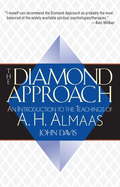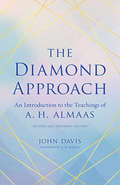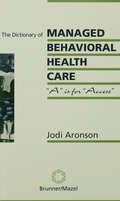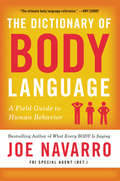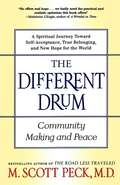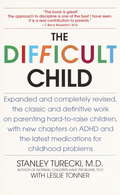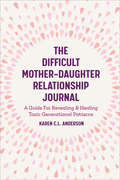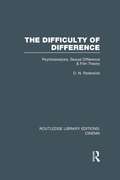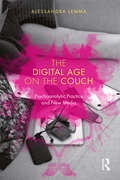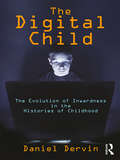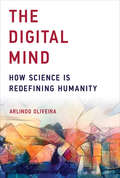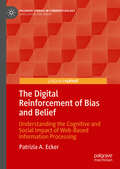- Table View
- List View
The Diamond Approach
by John Davis A. H. AlmaasThe Diamond Approach has been developed and taught over the last twenty-five years by Hameed Ali (known chiefly by his pen name, A. H. Almaas), who is widely recognized as a leader in the integration of spirituality and psychology. This is the first book to introduce the complete spectrum of his teachings to a general audience.
The Diamond Approach: An Introduction to the Teachings of A. H. Almaas
by John DavisA revised and expanded edition of the definitive guide to the Diamond Approach, the modern contemplative practice that integrates psychology and spirituality and emphasizes the importance of self-inquiry. The Diamond Approach has been developed and taught over the last forty-five years by Hameed Ali, who is known chiefly by his pen name, A. H. Almaas. This book, the first to offer a full overview of the Diamond Approach, is now revised and expanded with a new foreword by Almaas, a new preface by the author, and a new chapter that explores the most recent developments in Almaas's teaching and practice methods. Author John Davis offers a rich, compelling introduction to the unique spiritual tradition that philosopher Ken Wilber recommends as "the most balanced of the widely available spiritual psychologies/therapies." Influenced by ancient traditions such as Sufism and Buddhism as well as by modern psychology, the Diamond Approach is particularly well-suited to twenty-first century seekers who embrace both spirituality and science. Beginning with an account of his own work with the Diamond Approach, Davis proceeds to outline the tradition's central practice of Inquiry, a form of open-ended exploration of present-moment experience akin to mindfulness practice. From there, he launches readers into an exploration of metaphysical concepts such as soul, space, Essence, self-realization, and the dimensions of Being. Complex yet concise, profound yet accessible, The Diamond Approach offers readers bold new perspectives on reality and human potential.
The Dictionary Of Managed Care: A Is For Access
by Jodi AronsonThe idea of managed care has sparked much controversy including its impact on the insurance industry, employer providers of care, and the patients themselves. In the confusion that comes with deciphering this complex system, this book provides clear and concise definitions of the most commonly used words, phrases and abbreviations in the industry. If mental health professionals want to become a part of the managed care system, they need to understand the terminology. In addition to the easy-to-understand definitions, the author provides examples for further clarification and appendices which include: a termination summary, a treatment plan, a treatment update, and a release form for confidential information. The idea for this book came about after the author gave a lecture at a national conference and the audience repeatedly asked for definitions of basic managed care terms. Therefore, this dictionary does not contain a debate on the pros or cons of managed care or an inside look into the managed care system. Instead, the author has provided a valuable resource for the professional that will answer questions regarding the basic terms of this industry.
The Dictionary of Body Language: A Field Guide to Human Behavior
by Joe NavarroFrom the world’s #1 body language expert* comes the essential book for decoding human behavior Joe Navarro has spent a lifetime observing others. For 25 years, as a Special Agent for the FBI, he conducted and supervised interrogations of spies and other dangerous criminals, honing his mastery of nonverbal communication. After retiring from the bureau, he has become a sought-after public speaker and consultant, and an internationally bestselling author. Now, a decade after his groundbreaking book What Every BODY is Saying, Navarro returns with his most ambitious work yet. The Dictionary of Body Language is a pioneering “field guide” to nonverbal communication, describing and explaining the more than 400 behaviors that will allow you to gauge anyone’s true intentions.Moving from the head down to the feet, Navarro reveals the hidden meanings behind the many conscious and subconscious things we do. Readers will learn how to tell a person’s actual feelings from subtle changes in their pupils; the lip behaviors that betray concerns or hidden information; the many different varieties of arm posturing, and what each one means; how the position of our thumbs when we stand akimbo reflects our mental state; and many other fascinating insights to help you both read others and change their perceptions of you.Readers will turn to The Dictionary Body Language again and again—a body language bible for anyone looking to understand what their boss really means, interpret whether a potential romantic partner is interested or not, and learn how to put themselves forward in the most favorable light.*GlobalGurus.com
The Dictionary of Dreams: Every Meaning Interpreted (Complete Illustrated Encyclopedia Ser. #2)
by Quarto Publishing GroupOne of the most definitive books on the subject with more than 15,000 dream symbols to help you decode the meanings behind your nightly musings.The Dictionary of Dreams provides the necessary tools to interpret almost every dream object and its hidden meaning to better understand what your subconscious is telling you.Dreams can be fun and adventurous, but also frightening and distorted, and still again, they can be an endless combination of both. From spitting teeth out (a sign of aging), to creepy, crawly spiders (a sign that one feels like an outsider), dreams can mean much more to us once we learn how to decipher their hidden meanings. Whether positive or negative, The Dictionary of Dreamsgives you all the tools, symbols, and their true meanings to translate our cryptic nightly images.Starting with selections from classic texts like Interpretation of Dreams by Sigmund Freud, the father of psychoanalysis, and 10,000 Dreams Interpreted by Gustavus Hindman Miller, one of the first authors to complete a thorough study of all the symbols that appear in our dream-scape, this updated edition features revisions (such as the addition of cell phones, computers, televisions, and more) of Miller’s original interpretations to bring the book up to speed with our modern life.
The Dictionary of Psychology
by Ray CorsiniWith more than three times as many defined entries, biographies, illustrations, and appendices than any other dictionary of psychology ever printed in the English language, Raymond Corsini's Dictionary of Psychology is indeed a landmark resource. The most comprehensive, up-to-date reference of its kind, the Dictionary also maintains a user-friendliness throughout. This combination ensures that it will serve as the definitive work for years to come. With a clear and functional design, and highly readable style, the Dictionary offers over 30,000 entries (including interdisciplinary terms and contemporary slang), more than 125 illustrations, as well as extensive cross-referencing of entries. Ten supportive appendices, such as the Greek Alphabet, Medical Prescription Terms, and biographies of more than 1,000 deceased contributors to psychology, further augment the Dictionary's usefulness. Over 100 psychologists as well as numerous physicians participated as consulting editors, and a dozen specialist consulting editors reviewed the material. Dr. Alan Auerbach, the American Psychological Association's de facto dictionary expert, served as the senior consulting editor. As a final check for comprehensiveness and accuracy, independent review editors were employed to re-examine, re-review, and re-approve every entry.
The Dictionary of the Work of W.R. Bion
by Rafael E. Lopez-CorvoThis impressive work constitutes an important and timely addition to existing dictionaries of psychoanalytic ideas. It is not intended to replace the reading of Bion’s original texts nor is it a biography of W.R. Bion, the man. A brief history of Bion’s life is offered in the introduction to illuminate the conscious and unconscious factors that may have been an influence on his work, but the aim of this volume is to serve as an insightful and comprehensive guide to the often obscure meanings and terms explored and created by Bion throughout his many years, first as a psychiatrist and later as a psychoanalyst. It is an essential companion to the works of Bion that brings clarity and understanding to his absorbing concepts and is a vital addition to the library of anyone who has read and wondered over the writings of W.R. Bion.
The Diet Trap Solution: Train Your Brain to Lose Weight and Keep It Off for Good
by Judith S. Beck Deborah Beck BusisThe New York Times bestselling author of The Beck Diet Solution teams up with her daughter and colleague at the Beck Institute for Cognitive Behavior to teach readers how to think their way thin, offering practical, proven tools for escaping common diet traps for good.Most diet programs work at first. But then life happens—stress, bad habits, holidays, travel—and we revert to bad habits, and the weight comes back. In this invaluable book, Dr. Judith Beck offers the solution to break free from these common diet traps and keep the weight off for life.Dr. Beck explains that when it comes to losing weight, it’s not just about what we eat. It’s also about how we think. To consistently eat differently, we must learn to think differently. Diets fail us because they don’t offer effective strategies for overcoming the common traps—emotional eating, social pressure, dining out—that can derail us. Now, she and her daughter, Deborah Beck Busis, share the techniques they have successfully used with thousands of clients, revealing how to overcome the thoughts and behaviors that have held us back. With The Diet Trap Solution, readers on any diet regimen can learn to identify their specific diet traps and create action plans to strengthen their “resistance muscle”—making losing weight easy, sustainable, and enjoyable.
The Different Drum: Community Making and Peace
by M. Scott PeckThe overall purpose of human communication is - or should be - reconciliation. It should ultimately serve to lower or remove the walls of misunderstanding which unduly separate us human beings, one from another... Although we have developed the technology to make communication more efficient and to bring people closer together, we have failed to use it to build a true global community. Dr M. Scott Peck believes that if we are to prevent civilization destroying itself, we must urgently rebuild on all levels, local, national and international and that is the first step to spiritual survival. In this radical and challenging book, he describes how the communities work, how group action can be developed on the principles of tolerance and love, and how we can start to transform world society into a true community.
The Different Drum: Community Making and Peace
by M. Scott Peck'The overall purpose of human communication is - or should be - reconciliation. It should ultimately serve to lower or remove the walls of misunderstanding which unduly separate us human beings, one from another...' Although we have developed the technology to make communication more efficent and to bring people closer together, we have failed to use it to build a true global community. Dr M. Scott Peck believes that if we are to prevent civilization destroying itself, we must urgently rebuild on all levels, local, national and international and that is the first step to spiritual survival. In this radical and challenging book, he describes how the communities work, how group action can be developed on the principles of tolerance and love, and how we can start to transform world society into a true community.
The Different Drum: Community Making and Peace
by M. Scott Peck'The overall purpose of human communication is - or should be - reconciliation. It should ultimately serve to lower or remove the walls of misunderstanding which unduly separate us human beings, one from another...' Although we have developed the technology to make communication more efficent and to bring people closer together, we have failed to use it to build a true global community. Dr M. Scott Peck believes that if we are to prevent civilization destroying itself, we must urgently rebuild on all levels, local, national and international and that is the first step to spiritual survival. In this radical and challenging book, he describes how the communities work, how group action can be developed on the principles of tolerance and love, and how we can start to transform world society into a true community.
The Difficult Child and the Problem of Discipline (Collected Works of C.W. Valentine)
by C.W. ValentineOriginally published in 1940, this book was addressed to students of the psychology of childhood and to parents and teachers who were trying to get from psychology some light on problems of discipline and of the difficult child. It includes critical discussions of some ideas which were gaining widespread attention at the time and which masqueraded as sound psychology, but which seem to be both untrue and harmful. Topics dealt with include: fads and fallacies about discipline, repression and the inferiority complex, the supposed significance of sex in early childhood, early signs of abnormality, inborn individual differences, heredity and environment, are there "no problem children, only problem parents"?, is character determined by the early years?, the nursery school and the child guidance clinic, home discipline and the cooperation of parents, fallacies about corporal punishment.
The Difficult Child: Expanded and Revised Edition
by Stanley Turecki Leslie TonnerHow to help--and cope with--the difficult childExpanded and completely revised, the classic and definitive work on parenting hard-to-raise children with new sections on ADHD and the latest medications for childhood disorders.Temperamentally difficult children can confuse and upset even experienced parents and teachers. They often act defiant, stubborn, loud, aggressive, or hyperactive. They can also be clingy, shy, whiny, picky, and impossible at bedtime, mealtimes, and in public places. This landmark book has been completely revised to include the latest information on ADHD, medications, and a reassuring approach to all aspects of childhood behavioral disorders.In this parenting classic, Dr. Stanley Turecki, one of the nation's most respected experts on children and discipline--and himself the father of a once difficult child--offers compassionate and practical advice to parents of hard-to-raise children. Based on his experience with thousands of families in the highly successful Difficult Children Program he developed for Beth Israel Medical Center in New York City, his step-by-step approach shows you how to: Identify your child's temperament using a ten-point test to pinpoint specific difficulties Manage common--often "uncontrollable"--conflict situations expertly and gently Make discipline more effective and get better results with less punishment Get support from schools, doctors, professionals, and support groups Understand ADHD and other common diagnoses, and decide if medication is right for your child Make the most of the tremendous potential and creativity that many "difficult" children haveDrawing on his experience with thousands of families in his highly successful Difficult Child Program, Dr. Turecki shows parents how to:Identify their child's difficult temperament using a ten-point test to pinpoint specific difficultiesManage typical conflict situations expertly and kindlyMake discipline more effective and get better results with less punishmentGet support from schools, doctors, and others Understand ADHD and other common diagnoses, and decide whether medication is right for their childMake the most of the child's creativity and potential -->From the Trade Paperback edition.
The Difficult Mother-Daughter Relationship Journal: A Guide For Revealing & Healing Toxic Generational Patterns
by Karen C.L. AndersonA compassionate guide to reconciling or resolving strained relationships between mothers and daughters. As a mother-daughter relationship expert, Karen C.L. Anderson gently guides readers through revealing painful patterns in their relationships to finding ultimate healing. Her book isn&’t a quick fix. Rather, she writes to help mothers and daughters heal and either reconcile or peacefully separate. The author of the international bestseller The Peaceful Daughter&’s Guide to Separating from a Difficult Mother offers new practical wisdom in this journal. From setting healthy boundaries to creating a new outlook, Anderson helps create peace in their troubled relationships. You may feel alone in your struggle, but studies suggest that nearly 30% of women have been estranged from their mothers at some point. It can be difficult to talk about strain in these relationships because they are so often glorified in our society as one of the most precious bonds—but that makes them even more important to talk about. You&’ll find: · Various prompts and practices for building a relationship around healthy interdependence rather than dysfunctional codependence · A way to transform things that create pain into sources of wisdom and creativity · An informative and intriguing self-care resource for women in the form of a healing journal
The Difficulty of Difference: Psychoanalysis, Sexual Difference and Film Theory (Routledge Library Editions: Cinema)
by D. N. RodowickThis book argues that serious misreadings of Freud and Lacan on sexual difference have characterized prevailing models of psychoanalytic film criticism. In critiquing theories of identification and female spectatorship, the author maintains that early film theorists and feminist critics are equally guilty of imposing a binary conception of sexual difference on Freud’s thought. By embracing such a rigid definition of male/female difference, they fail to understand the fundamentally complex and fluid process of sexual identification as it is articulated in Freud’s writing, constructed in film texts, and negotiated by spectators. The book turns to Freud’s work on fantasy to develop an alternative model for interpreting sexuality in the visual and narrative arts, one that emphasizes a ‘politics of critical reading’ over accepted theories of ideological identification. Originally published in 1991, its strategic focus on psychoanalysis itself as an object of historical and critical inquiry, and not simply as a reading method is the unique quality of this book.
The Dig
by Cynan Jones"Jones's sense of place is acute, and his passion for the landscape--for its colors, its creatures, its textures, its scents--is absolutely magnetic."--Sarah Waters"A dark, tense, and vital short novel. . . . Profound, powerful, and utterly absorbing."--The Guardian"It is a book about the essentials: life and death, cruelty and compassion. It is a book that will get in your bones, and haunt you."--Daily Telegraph"Cynan Jones's fourth novel, The Dig, is an extraordinarily powerful work--not in spite of its brevity but because of it. . . . In its marriage of profound lyricism and feeling for place, deep human compassion and unflinching savagery, this brief and beautiful novel is utterly unique."--Financial TimesBuilt of the interlocking fates of a badger-baiter and a farmer struggling through lambing season, The Dig unfolds in a stark rural setting where man, animal, and land are at loggerheads. There is no bucolic pastoral here: this is pure, pared-down rural realism, crackling with compressed energy, from a writer of uncommon gifts.Cynan Jones was born near Aberaeron, Wales, in 1975. He is the author of three novels, The Long Dry (winner of a Betty Trask Award, 2007), Everything I Found on the Beach (2011), and The Dig (2014), winner of the Jerwood Fiction Uncovered Prize. He is also the author of Bird, Blood, Snow (2012), the retelling of a medieval Welsh myth. The Dig is his first novel published in the United States.
The Digital Age on the Couch: Psychoanalytic Practice and New Media
by Alessandra LemmaThe Digital Age is on the couch. Working today, it is essential that clinicians understand the world we live in. The transition from an industrial economy to an information economy impacts not just the external structure of society and commerce, but also the internal psychic economies of our brains and, inevitably, how clinicians conceptualise the analytic setting in which they practice as therapists and analysts. The Digital Age on the Couch seeks to understand more about how new technologies interact with the prerogatives of an individual’s internal world, how they may alter psychic structure itself in fundamental ways and the implications this may have for the individual’s functioning and for the operation of society. This book attempts, from the perspective of a working clinician, to make some sense of this. The impact of mediation via technology and the consequent disintermediation of the body represent central themes throughout, as they impact on the experience of embodiment, on the ‘work of desire’ and on the way new media influences psychoanalytic practice. New media offer opportunities for increasing accessibility to mental health care, including psychoanalytic interventions. However, this requires a sophisticated understanding of how to best create and safeguard the analytic setting. Alessandra Lemma here guides the clinician through an exploration of the limitations and risks of mediated psychotherapy, illustrated with clinical examples throughout. The Digital Age on the Couch offers an accessibly written guide to combining existing psychoanalytic theory and practice with the challenges presented by digital media. It will appeal to psychoanalysts, psychoanalytic psychotherapists and counsellors.
The Digital Child: The Evolution of Inwardness in the Histories of Childhood
by Daniel DervinNothing is more synonymous with the twenty-first century than the image of a child on his or her smart phone, tablet, video game console, television, and/or laptop. But with all this external stimulation, has childhood development been helped or hindered? Daniel Dervin is concerned that today's childhood has become unmoored from its Rousseauist-Wordsworthian anchors in nature. He considers childrens development to be inextricably linked with inwardness, a psychological concept referring to the awareness of ones self as derived from the world and the internalization of such reflections. Inwardness is the enabling space that allows ones thoughts, experiences, and emotions to be processed. It is an important adaptive marker of human evolution. In The Digital Child, Dervin traces the evolution of how we have perceived childhood in the West, and thus what we have meant by inwardness, from pre-history to today. He identifies six transformational stages: tribal, pedagogical, religious, humanist, rational, and citizen leading up to a new stage, the digital child. This stage has emerged from current unprecedented and pervasive technological culture. Dervin delves deeply into each stage that precedes today's, studying myths, literary texts, the visual arts, cultural histories, media reports, and the traditions of parenting, pediatrics, and pedagogy. Weaving together approaches from biology, culture, and psychology, Dervin revisits who we once were as a species in order to enable us to grasp who we are becoming, and where we might be heading, for better or worse.
The Digital Diet: The 4-step plan to break your tech addiction and regain balance in your life
by Daniel SiebergWe all know someone who needs a digital diet. Technology has overwhelmed our daily lives to the point of constant distraction. Many of us can no longer focus on a single task or face-to-face conversation without wanting to reach out--or retreat--to the virtual world every few minutes. Science and technology reporter and recovering digital addict Daniel Sieberg has devised a foolproof 4-step plan to help you regain control, focus, and true connection in your life. Step 1//Re: Think: Consider how technology has overwhelmed our society and the effect it's had on your physical, mental, and emotional health. Step 2//Re: Boot: Take stock of your digital intake using Sieberg's Virtual Weight Index and step back from the device. Step 3//Re: Connect: Focus on restoring the relationships that have been harmed by the technology in your life. Step 4//Re: Vitalize: Learn how to live with technology--the healthy way, by optimizing your time spent e-mailing, texting, on Facebook, and web surfing. This program will enable families to communicate better, employees to be more productive, and friends to stay in touch. Sieberg teaches us how to manage and use the technology in our lives to our advantage, without letting it control us.
The Digital Mind: How Science Is Redefining Humanity (The\mit Press Ser.)
by Arlindo OliveiraHow developments in science and technology may enable the emergence of purely digital minds—intelligent machines equal to or greater in power than the human brain.What do computers, cells, and brains have in common? Computers are electronic devices designed by humans; cells are biological entities crafted by evolution; brains are the containers and creators of our minds. But all are, in one way or another, information-processing devices. The power of the human brain is, so far, unequaled by any existing machine or known living being. Over eons of evolution, the brain has enabled us to develop tools and technology to make our lives easier. Our brains have even allowed us to develop computers that are almost as powerful as the human brain itself. In this book, Arlindo Oliveira describes how advances in science and technology could enable us to create digital minds. Exponential growth is a pattern built deep into the scheme of life, but technological change now promises to outstrip even evolutionary change. Oliveira describes technological and scientific advances that range from the discovery of laws that control the behavior of the electromagnetic fields to the development of computers. He calls natural selection the ultimate algorithm, discusses genetics and the evolution of the central nervous system, and describes the role that computer imaging has played in understanding and modeling the brain. Having considered the behavior of the unique system that creates a mind, he turns to an unavoidable question: Is the human brain the only system that can host a mind? If digital minds come into existence—and, Oliveira says, it is difficult to argue that they will not—what are the social, legal, and ethical implications? Will digital minds be our partners, or our rivals?
The Digital Reinforcement of Bias and Belief: Understanding the Cognitive and Social Impact of Web-Based Information Processing (Palgrave Studies in Cyberpsychology)
by Patrizia A. EckerThis book explores how digital environments amplify confirmation bias, shaping the way individuals consume, create, and recall information. Focusing on web-based platforms such as social media and online news, the book examines the role of active content creation and temporal dynamics in reinforcing existing beliefs and perpetuating cognitive feedback loops. Through original research and case studies, it highlights the interplay between algorithmic curation, participatory engagement, and misinformation spread in online spaces. This book fills a critical gap in research on the psychological mechanisms underlying bias formation in the digital age. It provides insights for tech leaders, media experts, and policymakers seeking to understand and mitigate the cognitive and societal impact of online information processing. By bridging the fields of cyberpsychology, media studies, and artificial intelligence, it offers strategies for fostering more balanced digital ecosystems.
The Digitalisation of (Inter)Subjectivity: A Psy-critique of the Digital Death Drive
by Jan De VosThis book explores the responsibility of psychological and neuropsychological perspectives in relation to the digitalisation of inter-subjectivity. It examines how integral their theories and models have been to the development of digital technologies, and by combining theoretical and critical work of leading thinkers, it is a new and highly original perspective on (inter)subjectivity in the digital era. The book engages with artificial intelligence and cybernetics and the work of Alan Turing, Norbert Wiener, Marvin Minsky, Gregory Bateson, and Warren McCulloch to demonstrate how their use of neuropsy-theories persists in contemporary digital culture. The author aims to trace a trajectory from psychologisation to neurologisation, and finally, to digitalisation, to make us question the digital future of humankind in relation to the idea of subjectivity, and the threat of the ‘death-drive’ inherent to digitality itself. This volume is fascinating reading for students and researchers in the fields of critical psychology, neuroscience, education studies, philosophy, media studies, and other related areas.
The Dilemmas of Intimacy: Conceptualization, Assessment, and Treatment
by Karen J PragerGrounded in the cognitive-behavioral approach, The Dilemmas of Intimacy focuses exclusively on understanding, assessing, and treating common problems with intimacy. Intimacy offers both risks and rewards, which create three dilemmas that every couple must negotiate: joy vs. protection from hurt, I vs. we, and past vs. present. These dilemmas offer readers a window into the treatment of intimacy problems, and help them to structure formulations, treatment goals, and therapeutic strategies.Unique to this book is the author’s “Intimacy Signature,” which is a comprehensive system for assessing couples’ intimacy issues, and offers a four-step formula for translating assessment data into therapeutic strategies. Along with the book, readers will have access to a web resource page that includes the Intimacy Signature assessment: therapist worksheets (that help match presenting problems to probable intimacy dilemmas), checklists of strengths and areas of vulnerability to assist the clinician in making a prognosis, a client take-home packet, and therapist tools for intervention (including therapist-client dialogues).
The Dinosaur Man: Tales of Madness and Enchantment from the Back Ward
by Susan BaurThe author asks questions about survival, love as perceived by chronically mentally delusional patients and by the rest of us including those who care for them and are their families friends and members of the society in which they and we live.
The Direction of Desire: John of the Cross, Jacques Lacan and the Contemporary Understanding of Spiritual Direction (The Palgrave Lacan Series)
by Mark Gerard MurphyThis book examines Lacanian psychoanalysis and Christian mystical theology demonstrating the former’s potential for reinvigorating spiritual direction. The author outlines how current methods of spiritual direction become saturated with self-help psycho-pop methodologies, and that desire has therefore been foreclosed in these practices. He suggests that the root of this is a focus on ‘positive affective experientialism’, which means spiritual direction must focus on emotional wholeness, healing and positivity. Finally, he argues that a new dialogue between John of the Cross (a mystic whose writings on spiritual direction formulate part of the core of the Catholic spiritual tradition) and Jacques Lacan can open the way for a spiritual direction beyond the confines of experientialism. The book concludes that we can only escape the experiential commodification of spiritual direction by critiquing the drive to experience in and of itself. This novel work will appeal in particular to students and scholars of psychoanalysis, religion, philosophy and critical theory.
